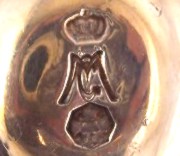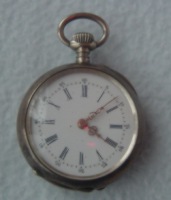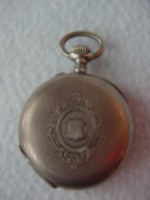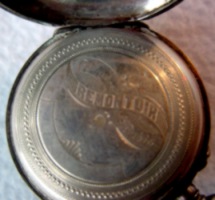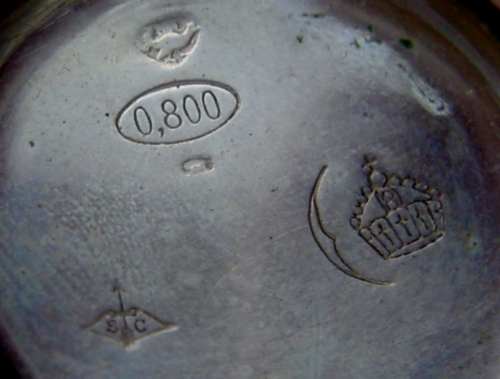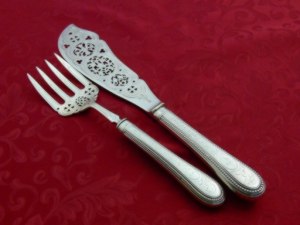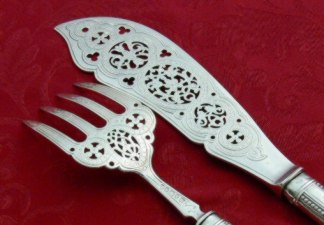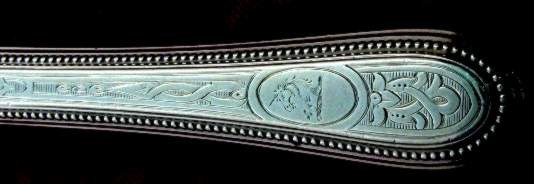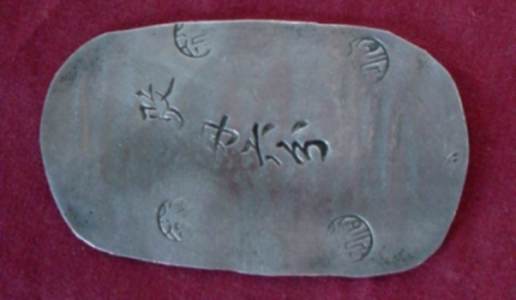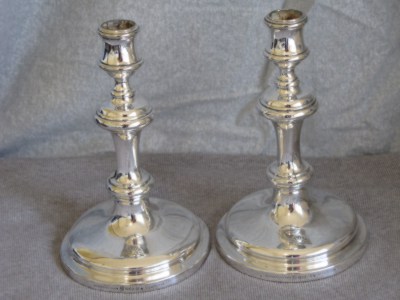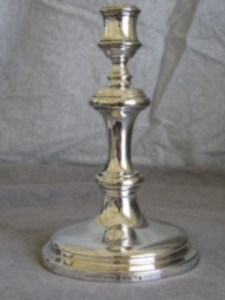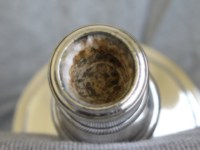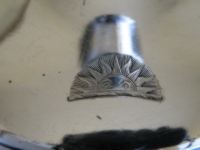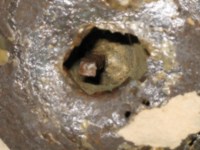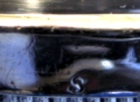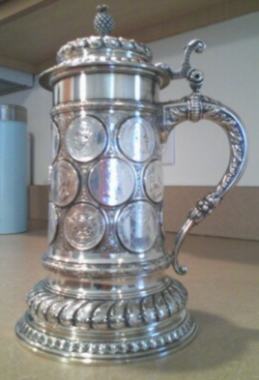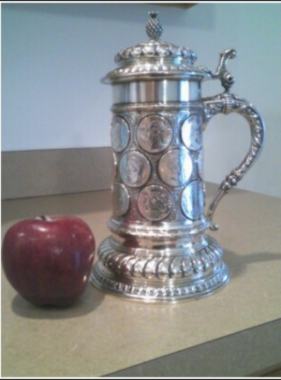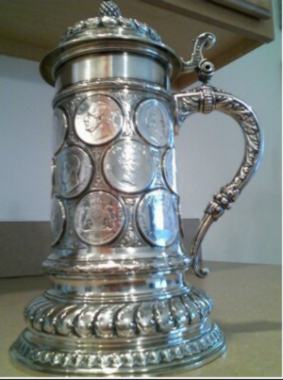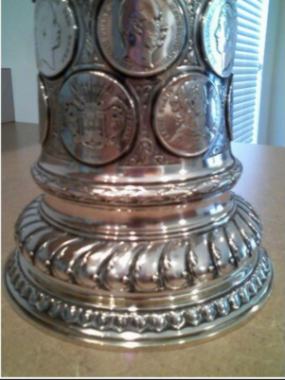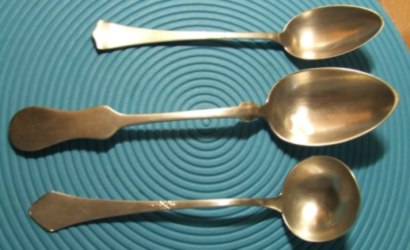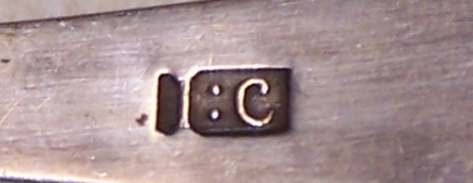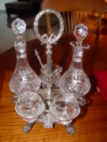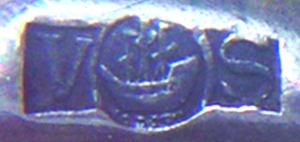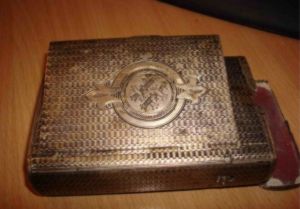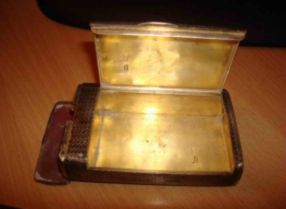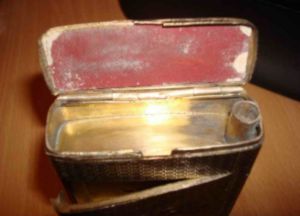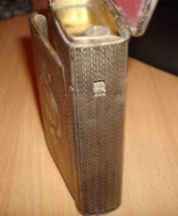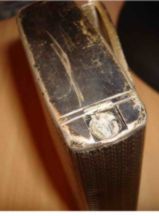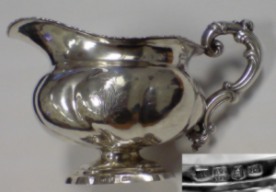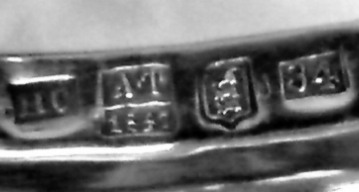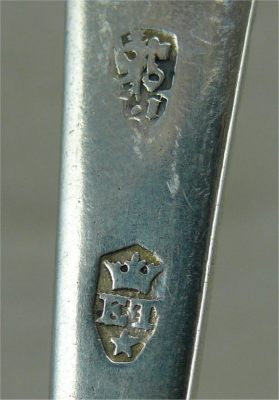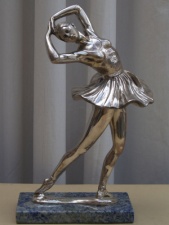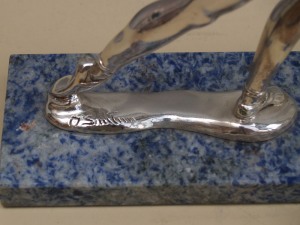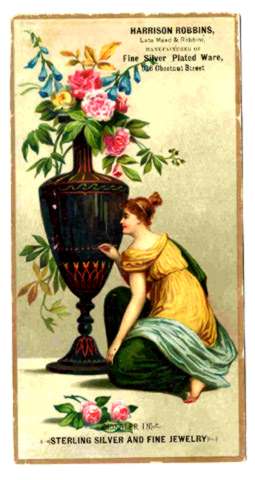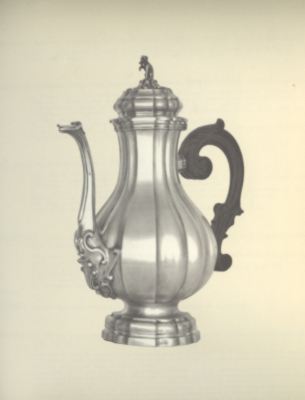 newsletter # 45 - FEBRUARY 2008
newsletter # 45 - FEBRUARY 2008www.ASCASonline.org
email: silverassociation@yahoo.it
YOUR GUIDE TO FEBRUARY NEWSLETTER:
articles new members
members' window
|
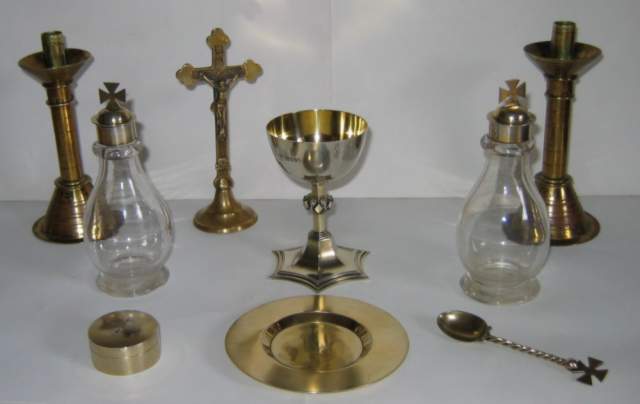
Giovanni Ciceri presents: |
New members
Welcome to new ASCAS members:
Luigi Cassano - Italy
Joseph Decrescenzo - USA
Frank Dominguez - USA
Luciano Fiorentini - Italy
Laura Groves - USA
Gregory La Vardera - USA
Patty McCurry - USA
Krista Olson - USA
Linda Pugh - USA
Rhonda Rhodes - USA
Amal Soliman - Egypt
Members' Window # 45
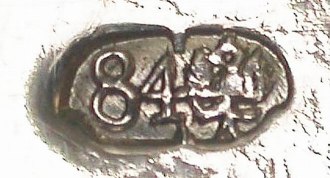
|
Mail to ASCAS: e-mail silverassociation@yahoo.it
Frank Church writes:
... I would like to ask the members if anyone has come across
the marks in the accompanying photo. I have heard them described
in the American auction rooms but never have they been
identified by maker or date.
I don't even know what country they are from.
Regards
Frank Church
Deborah Cracovia writes:
... I just purchased this ladies pocket watch and I would like
more information about the marks. I know that this is 800 German
silver but I could not find any info about the maker or other
(date) marks.
I have attached some photos to help.
I also noticed that one of the pieces has the mark EC in a bow
and arrow and on the other is a SE in a bow and arrow??
Thank you for any help
Deborah Cracovia
Besides German marks your watch bears also the 800/1000
Swiss marks in use between 1882 and 1934 (for both great and
small works).
Giorgio Busetto
Renée Watkins writes:
... can you help me identify this maker and also whether it is
sterling, as it was represented to me when I purchased it, or
silver plate. The closest I could find to these marks is a
Sheffield mark for 1861.
The marks are: Crown followed by the capital letter T followed
by a lion passant ( all in a 8 sided cartouche) followed by a
Queens head facing left in a round cartouche; followed by M.H. &
Co. in a stylized cartouche.
There is also a Unicorn on the Stem.
I have attached some photos.
Thanks again for your help.
Renée
Your sterling silver fish server was made by Martin, Hall &
Co Ltd and bears Sheffield 1861 hallmarks.
The firm origins by the partnership established in 1820 in
Sheffield by Henry Wilkinson and John Roberts who traded as
Wilkinson & Roberts. The firm's chronology is: John Roberts
(1836), Roberts & Hall ( 1846), Martin Hall & Co (1854), Martin
Hall & Co Ltd (1866-1936).
Martin Hall & Co was one of the best known British manufacturers
and participated to many international exhibitions including the
Crystal Palace 1851 Great Exhibition.
They had also a line of production in electroplate and in a
patented white metal called "Martinoid".
This information are available in the British marks pages of my
private website at
http://www.silvercollection.it/ENGLISHSILVERMARKSXM.html (sterling)
and
http://www.silvercollection.it/electroplatesilverM.html (electroplate).
The "unicorn" on the stem is a crest (see my
Silver Dictionary)
Giorgio Busetto
Neil Freeman writes:
...I recently purchased these Elkington silver-plate
candlesticks. Thank you for your very informative
"silvercollection" website the candlesticks appear to be
dated 1853.
What does the "S" mark indicate?
Can anyone tell me what the "sun" symbol is for: Is it the
retailer? Is it the client's symbol? Is it a decorative motif?
In heraldry this symbol is variously described as 'torse' or 'wreath'
issuant "sun in splendour".
The candlesticks appear to be reinforced with a ferrous metal
rod and weighted with pitch. Would Elkington have placed the rod
there? Should I restore the candlesticks by replacing the lost
pitch that has crumbled away?
What material and construction would have been used for where
the candle is inserted?
Best Regards
Neil Freeman
Gene Swartz writes:
...Can you tell me anything about this piece? The coins date
back from 1808-1868 . The hallmark is Kock & Bergfeld (800).
Aron 17704 is stamped on the bottom also.
Any info would be greatly appreciated.
Best Regards
Gene Swartz
Koch & Bergfeld was founded in Bremen in 1829 by Gottfried
Koch and Ludwig Bergfeld (born in Hannover). Executed 1900-10
designs by Hugo Leven, Albin Muller and Henry van de Velde and
in the twenties and thirties by Gustav Elsass and Bernhard
Hotger .
Images of Koch & Bergfeld marks are available in my website at
http://www.silvercollection.it/germansilverhallmark2.html
The firm is still active with a wide production of flatware and
holloware. Maybe contacting the firm you can obtain further
information about your tankard.
Giorgio Busetto
Vadim Dardik writes:
...I have some silver pieces, and seams that the hallmarks are
Austrian-Hungarian.
Could you please help me with identifying the other silver marks
on the set of silver spoons?
There are 3 marks on each spoon.
One of them is Diana's head.
The second one is mark of eagle.
The third one is man with helmet.
Can you or anyone help me with this matter?
Thank you very much.
Vadim Dardik.
Barry Star writes:
...I have some silver spoons with the attached hallmark, but
have been unable to identify it. Can you help? The origin may be
Egypt, Turkey, or Greece, or none of the above...
Thank you
Barry Star
Doudou Le Gros writes:
...I'm trying to identify the use of a silver item in my
possession. I believe it is a tobacco box with a lighter on the
side.
Any help would be greatly appreciated.
Doudou Le Gros
In my opinion your item is a cigarette case or a tobacco box
combined with matches' container (you omitted to supply the
measures of the item).
It looks to be made in St. Petersburg, Russia (end 19th century)
but I was unable to find any exact correspondence with its marks.
Giorgio Busetto
Nikica Vuletic writes:
...Please find attached a picture of an object that I am not
able to confirm as authentic.
It is an acquisition from a local flea market. I believe lot of
specialists and "specialists" examined this piece before I
bought it, but somehow were sceptic about its real origin and
age. So doubtful I was, but however I had no doubt about it is
made of solid silver.
Hallmarks are completely logical and each is matching with
others correctly. It is Tallinn 1847 with assayer AT monogram.
Three animals are part of city hallmark (exactly matching those
at your site) and 84 zolotniks mark is in a rectangle as it
should be. Silversmith HC into a rectangle.
First question: Is this a sauce boat or a creamer? (it is 17 cm
long, 10.5 cm high and weight is 216 grams and was gilded
inside).
Second question: If it is not authentic why should someone make
a copy of an object that has no significant market value?
Third question: Is it usual that all four hallmarks on the base
rim are turned upside down?
Best regards and best wishes for 2008.
Nikica
Thanks to Willand Ringborg's article
(ASCAS # 88) we know that the town mark is Tallin and that
"AT" is an unknown assayer active 1847/1852. Postnikova-Loseva (mark
#3508) identifies HC silversmith as Clemens Hermann Georg
(1806-1856).
I haven't the knowledge necessary to evaluate if your item is an
authentic Imperial Russia piece but, I admit, it would be a
great temptation for me if offered at a reasonable price in a
flea market.
My opinion is that it is a sauce boat while the "upside down"
marks don't signifies that the piece isn't authentic.
Anyway I trust in the support of more experienced members of
ASCAS for a qualified reply to your questions.
Giorgio Busetto
Replies to questions
| Christophe
Ginter receives another reply to his question about the
Suiss silversmith's mark:
( see January Newsletter) Charles C. Cage writes: ... In response to Christophe Ginter's question
regarding the marks on his Swiss spoon, the maker "ET"
is Etienne Terroux (ca. 1694-1774), master 1719.
Additionally, the upper Geneva mark has the worn
initials "IIG", which stood for guild warden
Jean-Jacques Girod (1700-1770) who served 1732-34 and
again 1760-62, so the spoon was made in one of those
years (presumably 1732-34 if the early 1700s stylistic
dating is correct).
|
| Ludo
D'Haese receives this reply to the question
about his Italian Sculpture:
( see march 2006 Newsletter) Luciano Fiorentini writes: ... I identified the maker of the sculpture
submitted by Ludo D'Haese in March 2006
Newsletter.
|
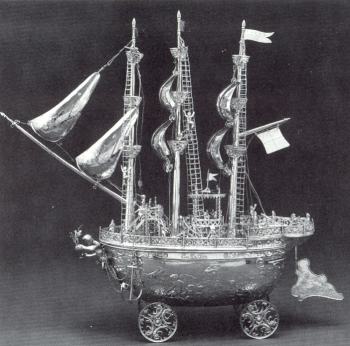
|
NEFnef is a dinner-table ornamental or
utilitarian article in the form of a
model of a ship, with masts, sails,
rigging and with various figures on
board.
|
"A BOOK ON MY SHELF"
In this column we
present books, new or ancient, dealing with
silver in all its aspects (history, marks,
oddities...). This isn't a "book review" but
only a fair presentation of some useful "tools"
that anyone may have in the shelf of his
bookcase.
ASCAS members are invited to contribute to this
column
(click to enlarge images)
The "book on the shelf" of this month is
ARGENTIERI GEMMARI E ORAFI D'ITALIA (Silversmiths,
Jewellers and Goldsmiths of Italy)
by Costantino Bulgari
printed by Lorenzo Del Turco, ROMA - 1959 -
Notizie Storiche e Raccolta (Historical
information with illustration of silversmith's
and town marks)
dei Loro Contrassegni
con la Riproduzione Grafica
dei Punzoni Individuali
e dei Punzoni di Stato
PARTE PRIMA ROMA (PART ONE ROME)
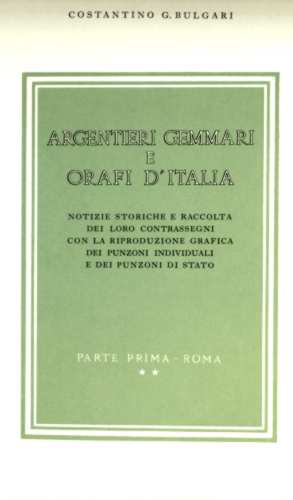 |
Closing our FEBRUARY 2008 edition of ASCAS Newsletter I hope you have appreciated its content.
Your comments, suggestions and advice will be of great help.
My thanks to Charles C. Cage, Giovanni Ciceri, Franck Church, Deborah Cracovia, Vadim Dardik, Jayne Dye, Luciano Fiorentini, Neil Freeman, Doudou Le Gros, Thomas Richardson, Willand Ringborg, Barry Star, Gene Swartz, Nikica Vuletic, Renée Watkins, JoAnne Wilkinson, for their invaluable contributions.
Giorgio Busetto
Secretary
ASCAS is a community of people
having a common interest in antique
silver.
|
|
|

